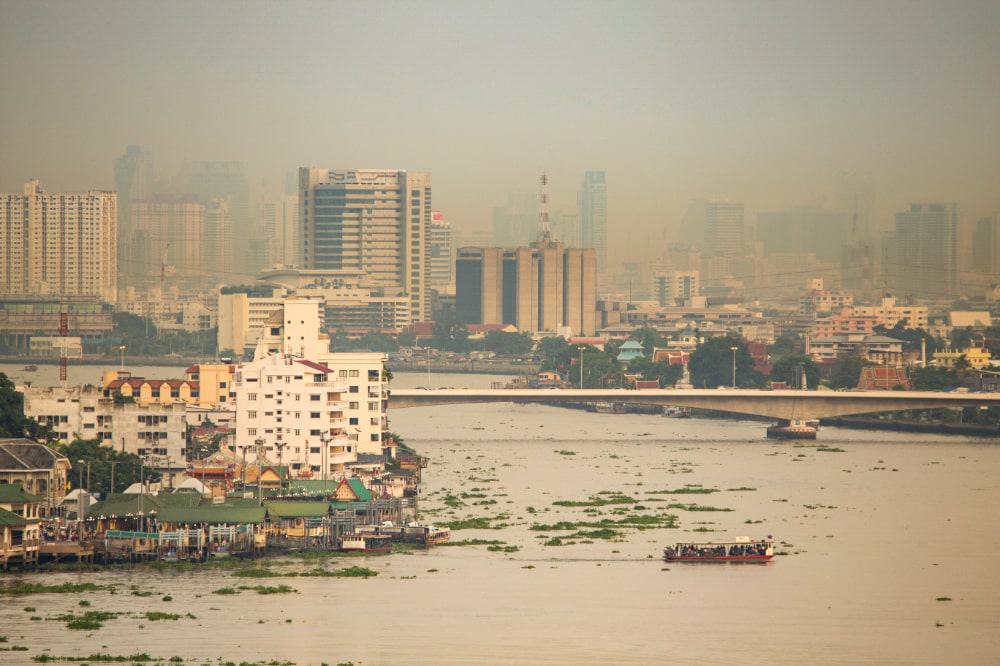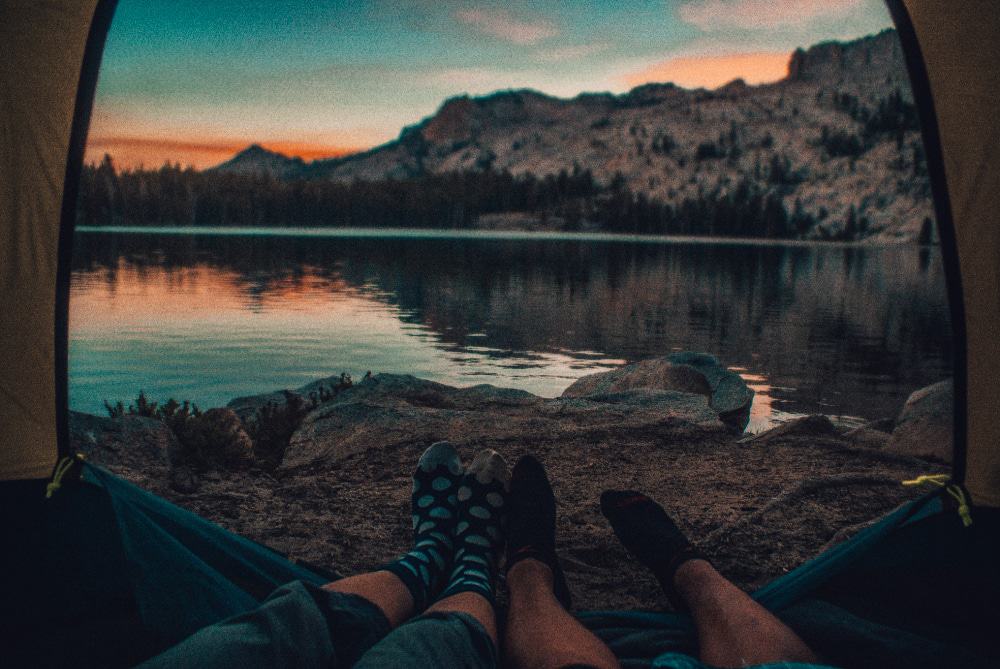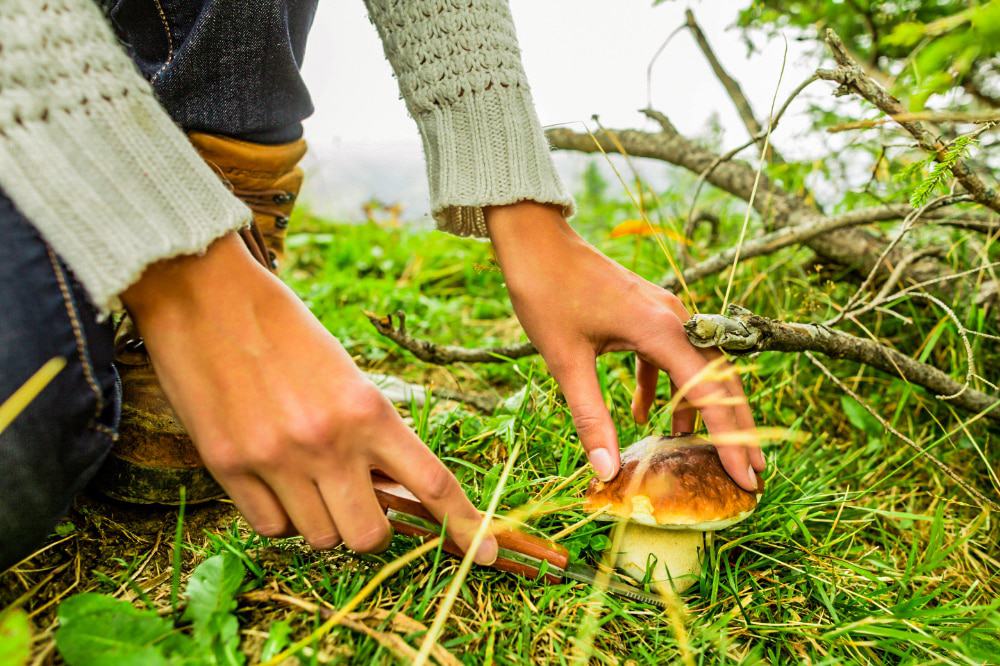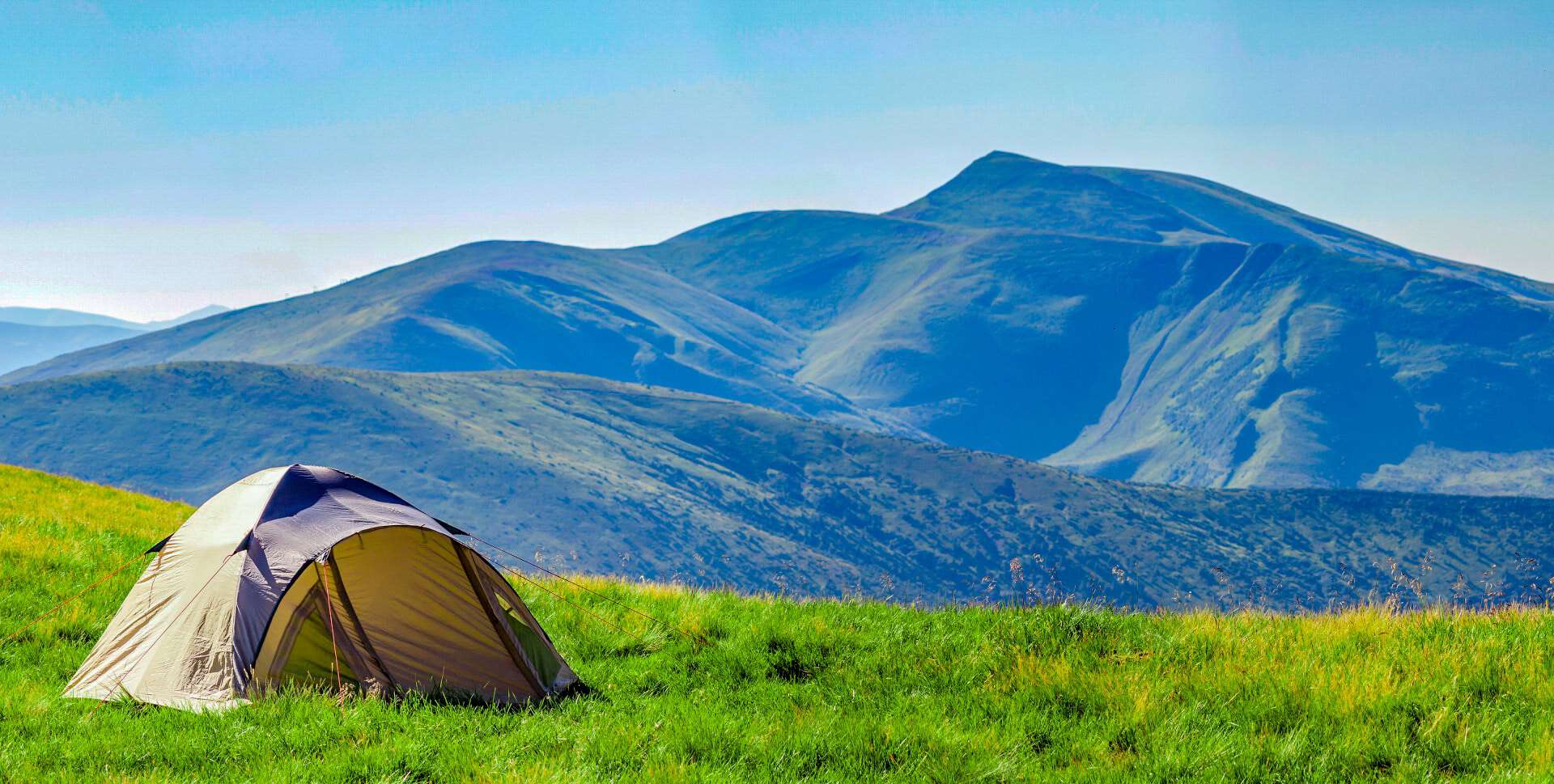2020 was a hard year, all things considered.
Once we were able to, I was desperate to go out camping again. It didn’t feel like a want so much as a need. I needed to get away from the city and spend a night under the stars.
And when I came back, I felt like a new person.
“But,” I hear you say, “obviously you like camping – you run such a wonderfully informed and well designed website dedicated to outdoor adventure!”
And you’d be right, the content we produce is well researched and accessible. Which is why this article about the benefits of camping – backed by science – will show you the joy of a night in the wilderness isn’t just in my head!
The benefits of camping include:
- Keeping fit and in shape
- Better air quality
- Reducing inflammation and improved immunity
- Resetting your internal clock for a better night’s sleep
- Reducing stress
- Alternative mental health treatments
- Reconnect with people
- Reconnect with nature
- Get away from technology
Related: Give this a shot with your partner – get started with our reviews of the best 10 person tent.
1. Reap the benefits of camping and Keep in Shape
Camping by its nature is more physically demanding than spending time at home. In comparison to an inactive homelife, camping requires hard work to have a good time.
Tents need set up, firewood needs collected and it might even take a while to hike to your campsite.
Obesity has been a growing problem in the USA and now stands at an estimated 42.4% of all adults [1]. This health epidemic has serious long- and short-term chronic disease implications for the population.
Whilst the challenge of reducing obesity in America is behemoth, one of the factors contributing to it is the increasingly sedentary lifestyle accelerated by technological innovation in recent decades [2].
Camping offers the opportunity for people to get away from the technology and comforts of modern living. Campers can get active and engage in outdoor pursuits and sports they might not otherwise have the chance to.
In 2019, 51% of campers [3] went hiking as part of their trip, making it the most popular outdoor recreation while camping. 37% went canoeing or kayaking and 30% went biking.
Hiking burns around 180 to 266 calories for every 30 minutes.
Here are the calories burned in 30-minutes of outdoor pursuits associated with camping:
| 125-pound person | 155-pound person | 185-pound person | |
|---|---|---|---|
| Hiking | 180 | 223 | 266 |
| Kayaking | 150 | 186 | 222 |
| Mountain Biking | 255 | 316 | 377 |
Source: Harvard Health Publishing
Physical activities are very popular while camping and bring a range of health benefits. Personally, I love going on hikes when I’m camping. It’s a chance to take in the landscape and reflect. Plus, there are lots of benefits of hiking as well!
Related: Picking the perfect tent often means taking your group size, and adding a few to the capacity so that there’s room for gear and room to spread out. Check out our reviews of the best 8 person camping tents – the perfect size for a family.
2. Breathe in the Fresh Air
Air – it’s the lifeblood of life on earth, we’d notice it immediately if it went missing, and yet, we take it for granted.
But clean air is becoming increasingly rare. To the point that in some cities in the world, doing just 30 minutes of exercise does more harm than good [4].
In recent decades, the Environmental Protection Agency (EPA) in the United States has had great success in improving air quality. The emission of air toxins has declined 74 percent since 1990 [5].
However, by 2019, 82 million American’s were still living in counties that pollution levels still exceed the National Ambient Air Quality Standards (NAAQS).
Tip: If you’re concerned about air pollution in your area, get involved with campaigns like the Healthy Air Campaign [6] to find out how you can help make a difference!
Air pollution has been well established as detrimental to our health. Respiratory and cardiovascular diseases as well as cancer have been linked to air pollution in urban environments [7].

This can be particularly harmful to children. Researchers at an asthma summer camp found that air pollution was significantly and consistently correlated with acute asthma exacerbations, chest symptoms and lung function decrements [8].
Camping offers the perfect opportunity to escape from the air pollution of urban environments and fill your lungs with some clean, fresh air.
Related: Looking for a huge tent for the family to spread out in? Check out our favorite 12 person tent for camping.
3. Reduce Harmful Inflammation
Researchers in China have found that shinrin-yoku or forest bathing can reduce proinflammatory cytokines (small proteins) in the immune system. These effects have been demonstrated by overnight camping trips.
Cytokines that can accelerate issues with arthritis, asthma and Crohn’s diseases were all found to be reduced after a two-night trip to the forest compared with a control group [9].
A similar study with elderly patients found a decline in pro-inflammatory factors associated with cardiovascular diseases after a seven-day trip to a forest [10].
Both these papers stated the difference in air pollution between the urban spaces and forests as a potential explanation.
4. A Good Night’s Sleep
Sleep deprivation is a growing concern across the globe, with serious health implications. In the US, sleep deprivation has been linked to 7 of the 15 leading causes of death [11].
It’s important to keep your internal body clock ticking steadily. Your circadian rhythm is important for regulating your sleep cycle as well as hormone production, body temperature, and digestion.
In a 2013 study, artificial lighting was argued to be responsible for a two-hour delay in our body’s natural circadian rhythm in modern environments. This is measured by levels of the hormone melatonin in our body.
Camping offers a potential solution to this issue. Following the schedule of sunlight and spending time outdoors helps to balance our melatonin levels and reset our circadian rhythm.
These effects can be achieved fairly quickly, with just a weekend being needed to jump-start an earlier and healthier sleep schedule [12].
I’ve noticed these effects myself. I sleep better after coming home from a camping trip even if it is just a short trip. I feel like the combination of fresh air, physical exercise, and exposure to sunlight helps me sleep better for a week or so after.
Recent research suggests [13] that the deterioration of sleep quality has been further accelerated by the widespread use of personal devices like phones, tablets, and computers.
Tip: Blue light filters [14] are available for smartphones which can reduce the device’s impact on your sleeping pattern
Camping offers an opportunity to ditch the devices for a weekend and reset your natural body clock.
5. Stress Busting
The American Psychology Association [15] has been growing increasingly concerned with the rise in reporting of stress-induced deterioration of wellbeing. Self-reported anxiety, anger, and fatigue associated with stress have all risen.
Stress is associated with physical health issues. A common worry about individuals with high-stress levels is that as their blood pressure rises due to stress, their risk of a stroke or heart attack does too.
Taking a vacation to go camping offers an opportunity to escape from the pressures of work and modern life. The need to escape is consistently listed in studies on motivations for going camping [16].
There has been plenty of research to show that simply being in nature can reduce stress indicators such as cortisol. Whilst there are fewer papers focusing on camping, a study on overnight trips to the forest have found the trip lowered stress levels [17].
A separate study from Taiwan [18] used salivary α-amylase, a major enzyme in the mouth, as an indicator of stress levels. Researchers found significantly lower levels in participants who had engaged in an overnight forest bathing trip compared to those in an urban setting.
Camping will benefit from the stress-reducing effects being in nature offers, as well as the removal of stress triggers through reduced screen time and healthier sleep.
Tip: Make sure to take some “me time” when camping for a change to destress
6. Alternative Therapy
Research into the effects of forest-based therapy for the treatment of depression and anxiety in patients with chronic stroke disease found lower indicators of anxiety and depression after participants engaged in a 4-day therapy session in a recreational forest area [19].
However, the study had further implications. The comparative control group who engaged in the same therapy sessions in an urban environment reported an increase in indicators of anxiety and depression.
Camping based therapy might be useful for patients who have been resistant to traditional therapies.
Research from the University of Essex [20] has indicated that immersion in natural settings is not only beneficial as a treatment for depression but as a preventative measure as well. It can encourage healthy stress responses and recovery patterns vital to mental health.
This is supported by a study from Denmark [21] that found access to residential green spaces in childhood is associated with a lower risk of psychiatric disorders like depression from adolescence into adulthood.
Outdoor adventure is not, and should not be trialed as, an alternative to professional mental health care. But engaging in activities like camping can be an effective part of treatment and care.
Related: Don’t just read – take action! Check out our top pick for the best 6 person camping tent and take your family or friends with you!
7. Social Benefits – Reboot Relationships
The positive association between outdoor recreation and family cohesion has been consistently reported in research [22]. Increased quality time, socialization, and mutual problem-solving leads to better family cohesion [23].
In their analysis of vacation activity and family cohesiveness, Lehto et al. argue [24] that nature seeking vacationers who regularly engage in activities like camping and hiking are the most well bonded.
All vacations are important for family bonding but outdoor recreation and sports-based activities were more productive in encouraging better social interaction between family members.
Camping is the ideal vacation setting to facilitate these experiences and grow as a family. Research has shown that after multiday camping trips, family interaction improved and communication became more amicable [25].
Working together to set up camp, build fires, and prepare dinner in the new environment of camping helps build better communication and relationships between family members.
I have good memories of camping trips with my family when I was younger. It’s where I learned a lot of camping skills like how to pitch a tent or start a campfire. Those trips also taught me to really appreciate the great outdoors as well.
Trips like these are also important for passing on lessons about responsible outdoor recreation. Our guide to the Leave No Trace principles provides some valuable talking points and teachable moments.
Camping is also good for other relationships. It can provide a therapeutic environment for couples to maintain their relationships [26] and can even lead to an improved sex life [27].

There are social development benefits for children going camping as well! 64% of parents said [28] that their children had improved their social skills and mental health through camping trips.
Tip: Even if you go camping alone, it can function as self-care and be an important part of developing positive psychological patterns to communicate better with the people in your life.
8. Connect with Nature
As well as a need to escape from modern life, campers listed a desire to reconnect with nature as one of the main motivations for trips. Modern urban environments can feel very disconnected from the natural world.
Earthing (or grounding) refers to the benefits (including better sleep and pain management) that result from walking barefoot outside. Research suggests that connection to the earth’s electrons promotes physiological changes that bring about these improvements in wellbeing.
The research done to date suggests [29] that earthing or grounding may in fact have substantial health benefits and should be included as part of a healthy lifestyle.
Tip: To feel even more connected with nature, consider going fishing or foraging for food while camping!

9. Unplug and Unwind
The average US adult spends 3 hours and 43 minutes a day on their mobile device [30]. For teenagers, the average was significantly higher at 7 hours and 22 minutes a day [31].
You can check your own screen time use on your smartphone. Mine is 1 hour and 47 minutes on average this week, which I was actually pleasantly surprised by. I’m doing better than average at least!
But this usage still adds up to over 22 days in a year spent on my phone. That’s a lot of time, especially when I consider that it’s only one device – it doesn’t factor in my computer, laptop, or TV…
There are a number of studies linking excessive electronic device screen time with health issues, including diabetes [32], language development [33], and mental health issues [34].
Regular interaction with our cell phones affects our ability to think, remember, regulate emotion, and pay attention. It also makes segmenting work and home life difficult, preventing detachment and recovery from work.
This can influence our ability to connect to the people around us like family or partners. Removing the distraction and pressure of communication technology improves our face-to-face interaction.
Wrapping It All Up
So it should be clear that not only is camping good fun, but the science has spoken – there’s a range of benefits associated with it!
You can enjoy breathing in the fresh air whilst getting lots of exercise and reconnect with nature and the people around you when camping.
So what are you waiting for? Get camping!
References
[1] https://www.cdc.gov/nchs/products/databriefs/db360.htm
[2] https://www.ncbi.nlm.nih.gov/pmc/articles/PMC3228640/
[3] http://www.koapressroom.com/#:~:text=The%20annual%20North%20American%20Camping%20Report%20is%20an%20industry%2Dleading,and%20trends%20across%20North%20America.
[4] https://www.theguardian.com/cities/2017/feb/13/tipping-point-cities-exercise-more-harm-than-good
[5] https://www.epa.gov/air-trends/air-quality-national-summary
[6] https://www.lung.org/policy-advocacy/healthy-air-campaign
[7] https://www.niehs.nih.gov/health/topics/agents/air-pollution/index.cfm
[8] https://www.atsjournals.org/doi/abs/10.1164/ajrccm.155.2.9032209
[9] https://pubmed.ncbi.nlm.nih.gov/22840583/
[10] https://www.journal-of-cardiology.com/article/S0914-5087(12)00185-2/fulltext
[11] https://www.ncbi.nlm.nih.gov/pmc/articles/PMC6473877/
[12] https://www.cell.com/current-biology/pdfExtended/S0960-9822(16)31522-6
[13] https://www.ncbi.nlm.nih.gov/pmc/articles/PMC6473877/
[14] https://www.allaboutvision.com/en-gb/digital-eye-strain/blue-light/
[15] https://www.apa.org/news/press/releases/stress/2017/state-nation.pdf
[16] https://journals.sagepub.com/doi/abs/10.1177/1356766714532464
[17] https://www.ncbi.nlm.nih.gov/pmc/articles/PMC2793341/
[18] https://www.mdpi.com/1999-4907/9/7/403/htm
[19] https://pubmed.ncbi.nlm.nih.gov/27033879/
[20] https://pubs.acs.org/doi/10.1021/es305019p
[21] https://www.pnas.org/content/116/11/5188.abstract?etoc=
[22] https://www.tandfonline.com/doi/abs/10.1080/00222216.1970.11970005
[23] https://www.tandfonline.com/doi/abs/10.1080/01490400.2014.995325
[24] https://www.tandfonline.com/doi/abs/10.1080/10548408.2012.730950
[25] https://www.tandfonline.com/doi/abs/10.1080/01490400903430905
[26] https://www.emerald.com/insight/content/doi/10.1108/TC-12-2013-0034/full/html
[27] https://pressreleases.responsesource.com/news/79780/camping-improves-your-sex-life/#.VcUZbuhVikq
[28] https://www.campingandcaravanningclub.co.uk/newsandevents/mediacentre/reports-and-statistics/get-kids-camping-research-results/
[29] https://www.ncbi.nlm.nih.gov/pmc/articles/PMC3265077/
[30] https://elitecontentmarketer.com/screen-time-statistics/
[31] https://www.commonsensemedia.org/research/the-common-sense-census-media-use-by-tweens-and-teens-2019
[32] https://adc.bmj.com/content/102/7/612
[33] https://journals.lww.com/jrnldbp/Fulltext/2019/02000/Mobile_Media_Device_Use_is_Associated_with.3.aspx
[34] https://journals.sagepub.com/doi/10.1177/2167702617723376
Further Reading
Bowles, N. (2020) Coronavirus Ended the Screen-Time Debate. Screens Won., https://www.nytimes.com/2020/03/31/technology/coronavirus-screen-time.html
Offering an interesting dimension to the screen-time debate and how we interact with technology, Nellie discusses our changing relationship with communication devices as face-to-face communication became restricted.
Mealer, B. (2019) How going camping saved my sanity – and made me a better father, https://www.theguardian.com/lifeandstyle/2019/apr/30/how-going-camping-saved-my-sanity-and-made-me-a-better-father
Bryan offers his perspective on the benefits of camping with his children – and how it’s saving him from being overwhelmed by toxic politics and a society he is increasingly disconnected from.
